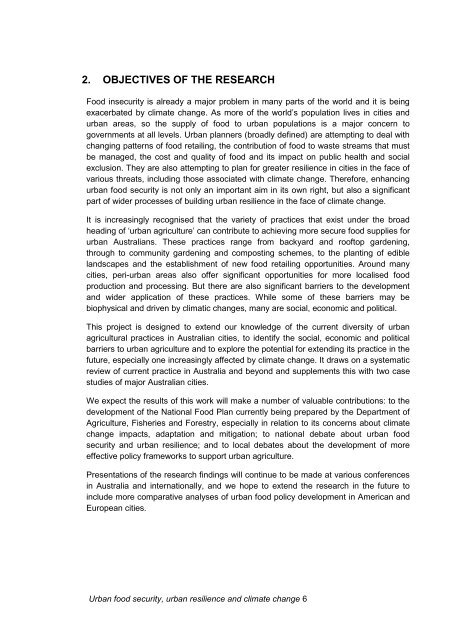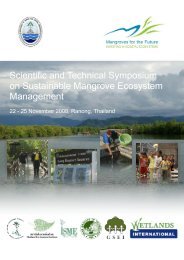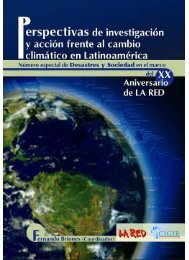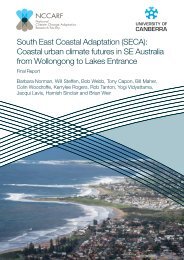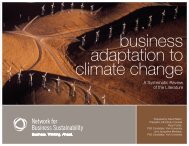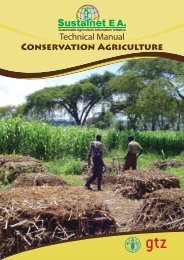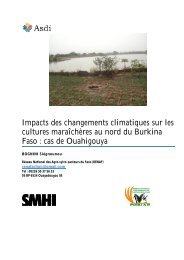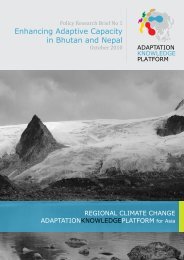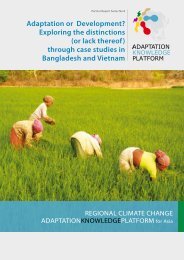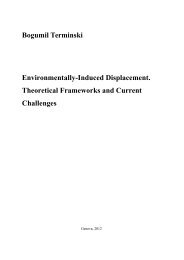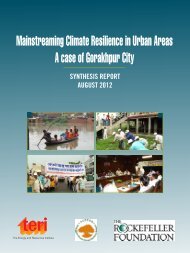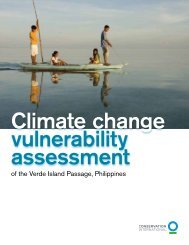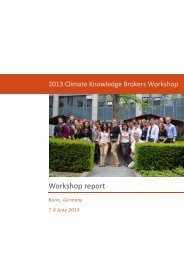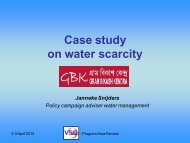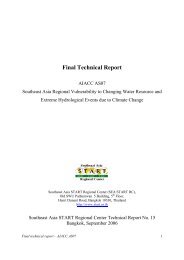Urban food security, urban resilience and climate change - weADAPT
Urban food security, urban resilience and climate change - weADAPT
Urban food security, urban resilience and climate change - weADAPT
Create successful ePaper yourself
Turn your PDF publications into a flip-book with our unique Google optimized e-Paper software.
2. OBJECTIVES OF THE RESEARCHFood in<strong>security</strong> is already a major problem in many parts of the world <strong>and</strong> it is beingexacerbated by <strong>climate</strong> <strong>change</strong>. As more of the world’s population lives in cities <strong>and</strong><strong>urban</strong> areas, so the supply of <strong>food</strong> to <strong>urban</strong> populations is a major concern togovernments at all levels. <strong>Urban</strong> planners (broadly defined) are attempting to deal withchanging patterns of <strong>food</strong> retailing, the contribution of <strong>food</strong> to waste streams that mustbe managed, the cost <strong>and</strong> quality of <strong>food</strong> <strong>and</strong> its impact on public health <strong>and</strong> socialexclusion. They are also attempting to plan for greater <strong>resilience</strong> in cities in the face ofvarious threats, including those associated with <strong>climate</strong> <strong>change</strong>. Therefore, enhancing<strong>urban</strong> <strong>food</strong> <strong>security</strong> is not only an important aim in its own right, but also a significantpart of wider processes of building <strong>urban</strong> <strong>resilience</strong> in the face of <strong>climate</strong> <strong>change</strong>.It is increasingly recognised that the variety of practices that exist under the broadheading of ‘<strong>urban</strong> agriculture’ can contribute to achieving more secure <strong>food</strong> supplies for<strong>urban</strong> Australians. These practices range from backyard <strong>and</strong> rooftop gardening,through to community gardening <strong>and</strong> composting schemes, to the planting of ediblel<strong>and</strong>scapes <strong>and</strong> the establishment of new <strong>food</strong> retailing opportunities. Around manycities, peri-<strong>urban</strong> areas also offer significant opportunities for more localised <strong>food</strong>production <strong>and</strong> processing. But there are also significant barriers to the development<strong>and</strong> wider application of these practices. While some of these barriers may bebiophysical <strong>and</strong> driven by climatic <strong>change</strong>s, many are social, economic <strong>and</strong> political.This project is designed to extend our knowledge of the current diversity of <strong>urban</strong>agricultural practices in Australian cities, to identify the social, economic <strong>and</strong> politicalbarriers to <strong>urban</strong> agriculture <strong>and</strong> to explore the potential for extending its practice in thefuture, especially one increasingly affected by <strong>climate</strong> <strong>change</strong>. It draws on a systematicreview of current practice in Australia <strong>and</strong> beyond <strong>and</strong> supplements this with two casestudies of major Australian cities.We expect the results of this work will make a number of valuable contributions: to thedevelopment of the National Food Plan currently being prepared by the Department ofAgriculture, Fisheries <strong>and</strong> Forestry, especially in relation to its concerns about <strong>climate</strong><strong>change</strong> impacts, adaptation <strong>and</strong> mitigation; to national debate about <strong>urban</strong> <strong>food</strong><strong>security</strong> <strong>and</strong> <strong>urban</strong> <strong>resilience</strong>; <strong>and</strong> to local debates about the development of moreeffective policy frameworks to support <strong>urban</strong> agriculture.Presentations of the research findings will continue to be made at various conferencesin Australia <strong>and</strong> internationally, <strong>and</strong> we hope to extend the research in the future toinclude more comparative analyses of <strong>urban</strong> <strong>food</strong> policy development in American <strong>and</strong>European cities.<strong>Urban</strong> <strong>food</strong> <strong>security</strong>, <strong>urban</strong> <strong>resilience</strong> <strong>and</strong> <strong>climate</strong> <strong>change</strong> 6


